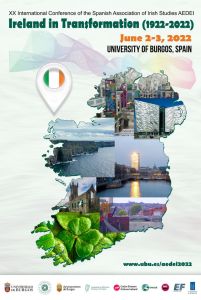 After five years of struggle for independence, the proclamation of the Irish Free State on December 6, 1922 marked the beginning of a unique episode in Irish history. The 20th century witnessed relevant events such as the partition of Ireland and the consolidation of the Republic, which featured a nationalism characterized by self-sufficiency and a marked protectionist policy. This tendency changed from 1973 onwards, when Ireland joined the European Economic Community. The last decades have witnessed a rapid diversification of Irish society, which has made the country a benchmark for economic success characterised by the interplay between the local and the global, and during this time, the field of Irish Studies has undergone a profound transformation.
After five years of struggle for independence, the proclamation of the Irish Free State on December 6, 1922 marked the beginning of a unique episode in Irish history. The 20th century witnessed relevant events such as the partition of Ireland and the consolidation of the Republic, which featured a nationalism characterized by self-sufficiency and a marked protectionist policy. This tendency changed from 1973 onwards, when Ireland joined the European Economic Community. The last decades have witnessed a rapid diversification of Irish society, which has made the country a benchmark for economic success characterised by the interplay between the local and the global, and during this time, the field of Irish Studies has undergone a profound transformation.
The exploration of and reconciliation with a past of colonial oppression, and the understanding of national Irish culture, history and society, have gone hand in hand with the modernisation and internationalisation of the island. Furthermore, recent decades have accelerated processes of industrialization, urbanisation and globalisation, with the Information and Communications Technology (ICT) becoming “a pressing contemporary issue” (Halperin, 2006: 533) in Ireland today, and resulting in noticeable demographic changes and the secularization of society. Undoubtedly, contemporary Ireland faces important challenges ahead in the post-Brexit European Union and in its political relations with the United Kingdom and its borders. Further, the Covid-19 pandemic situation has spurred connections and altered interpersonal relations in ways still to be fathomed.
These transformations have brought to light societal wounds and challenges that include the institutionalisation of unmarried mothers and their children, multiculturalism and the integration of minorities, the debate around reproductive rights, and the housing problem. As a response to these asymmetries of power, social movements and activism have taken a decisive role in campaigns such as repealing the eighth amendment of the Irish Constitution, the MeToo movement, the Marriage Equality referendum, the Extinction Rebellion global movement to combat climate change, and the fight against homelessness, among others. Also, several Irish authors have been using their art to engage with questions about political agency and subjectivity, providing “a sustained reflection on the precarity of individual life in the face of national and planetary challenges” (Sen 2019: 14).
In the light of these changes, the field of Irish Studies has progressively incorporated new angles and perspectives in conversation with a wide range of academic disciplines and theoretical approaches. Within this field, the Asociación Española de Estudios Irlandeses (AEDEI) is celebrating its 20th International Conference, with an eye on what has been accomplished so far in the socio-political and cultural arenas, and what lies ahead of us for a better understanding of Ireland as a country in transformation. To this end, this conference has a broad and international focus, and encourages critical and transdisciplinary approaches to the complex experiences, narratives and changes lived in Ireland in the last century, as well as to the dissenting, alternative and innovative social, literary and artistic expressions that inform its near future.

